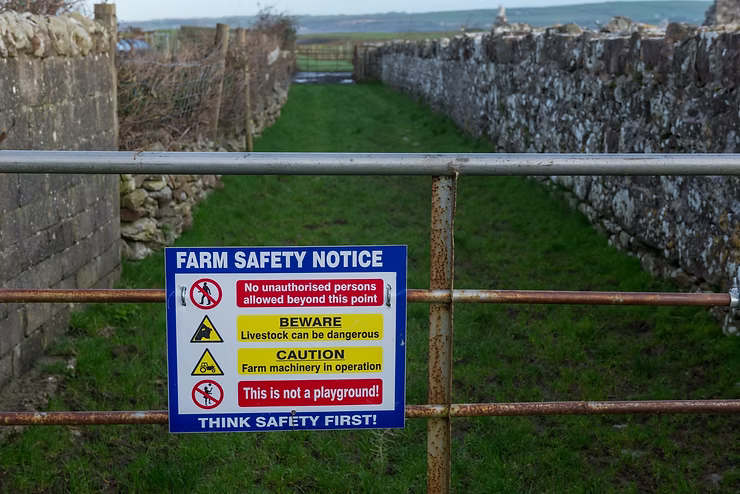Farming is rewarding, but it’s also one of the UK’s most dangerous industries. Heavy machinery, long hours, and demanding conditions mean farmers face daily risks to their hearing, hands, and limbs. By taking safety seriously, you can reduce accidents and protect your wellbeing on the job.
Common Questions Farmers Ask About Farm Safety
-
What farm safety signs do I need on my land?
-
How can I protect my hearing when using tractors and machinery?
-
Which PPE is essential for farm workers in the UK?
-
What are the most common farm machinery accidents?
-
Do I need warning signs for visitors on my farm?
Recognising Farm Machinery Hazards
From tractors to chainsaws, every machine poses risks. Moving parts can cause entrapment, rollovers may result in severe injury, and constant noise can damage hearing. Noise levels on farms often exceed safe decibel limits, meaning long-term hearing loss is a real risk without proper protection.
Staying alert, managing fatigue, and never rushing jobs are vital steps to prevent machinery accidents.
Hand and Limb Safety: Working Practices That Save Lives
Farms rely on manual work, but protecting your hands and limbs is crucial:
-
Never touch or repair running machinery – always switch off first.
-
Use the right tool for the job – don’t improvise with unsafe alternatives.
-
Wear protective clothing – gloves, sturdy boots, and fitted clothing reduce injury risk.
Making safety habits part of your routine could prevent life-changing accidents.
Hearing Protection: Managing Noise on the Farm
Long-term exposure to loud machinery can cause irreversible hearing damage.
-
Identify noise sources – tractors, saws, and threshers.
-
Use PPE – ear defenders or noise-cancelling plugs reduce exposure by up to 30 dB.
-
Upgrade machinery – newer models are often quieter.
-
Schedule noisy tasks wisely – limit exposure hours.
Your hearing is as valuable as any other part of your body—protect it daily.
The Importance of Maintenance
Just like livestock, machinery needs care. Regular maintenance prevents breakdowns and reduces risk. Always check:
-
Tyres, belts, and chains.
-
Hydraulic systems and attachments.
-
Safety switches and guards.
Fix issues immediately. Ignoring them can lead to serious accidents.
Training and Awareness: Building a Safe Team
Farm workers should receive regular safety training covering machinery use, PPE, and recognising warning sounds. Ongoing refreshers keep safety front-of-mind. An informed team is a safe and productive one.
Legal Obligations: Farm Safety Regulations in the UK
Farm owners must comply with Health and Safety Executive (HSE) regulations, including the Health and Safety at Work Act 1974. Regular safety audits help identify risks and ensure legal compliance. Protecting workers isn’t just a legal duty—it’s a moral one.
Technology and Farm Safety Innovations
Modern farms benefit from new technology:
-
Tractors with roll-over protection and auto shut-off.
-
Machinery with noise-reduction features.
-
Wearable devices such as smart gloves and noise monitors.
-
Safety apps for risk assessments and incident reporting.
These tools don’t replace vigilance but add a strong layer of protection.
Final Thoughts
Farm safety isn’t just about avoiding accidents—it’s about creating a culture where wellbeing comes first. From safety signs and PPE to training and modern technology, every step you take reduces risks. Remember: a safe farm is a successful farm.



Share:
Farm Safety and Confined Spaces
Tractor Farm Safety in the UK